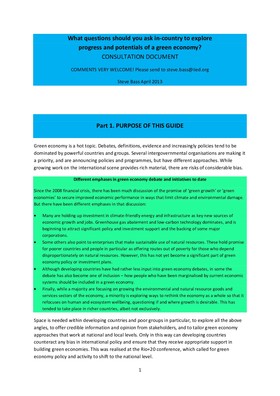What questions should you ask in-country to explore progress and potentials of a green economy?

Green economy is a hot topic. Debates, definitions, evidence and increasingly policies tend to be dominated by powerful countries and groups. Several intergovernmental organisations are making it a priority, and are announcing policies and programmes, but have different approaches. This guide aims to encourage dialogue and diagnosis in and by developing countries. It is based on the experience of ten dialogues facilitated independently by IIED, and emphasises: ~• Inputs from diverse geographies – where green economy remains a contested idea internationally and many powerful players are promoting a narrow green growth agenda, dialogues and diagnostics provide the basis for credible and compelling national inputs ~• Evidence of what works – where green economy remains too often a general and contested concept, evidence can provide encouragement of what to scale up locally and can back up or challenge different claims for green economy policy ~• A focus on inclusion and equity – where this element has been missing in too much green economy planning, ensuring all stakeholders have their say and contribute evidence, and that green economy plans include and benefit poor/marginalised groups ~• A focus on ‘doubly green’ – where greenhouse gas abatement has dominated plans to date, and developing countries are a minor source, it makes sense to complement this aspect with ensuring that plans address other environmental hazards and potentials, too~• Basis for country-tailored green economy strategy – with proprietorial (if not biased) approaches to green economy being promoted by different agencies, a country-driven and country-tailored approach is needed to ensure stakeholders get what they need, rather than what they are given. Part 2, the core of this guide, comprises a checklist of green economy issues and requirements, with a set of questions to elicit opinion and information on them. Part 3 offers brief suggestions on how to run the dialogue process.
Cite this publication
Available at https://www.iied.org/g03702